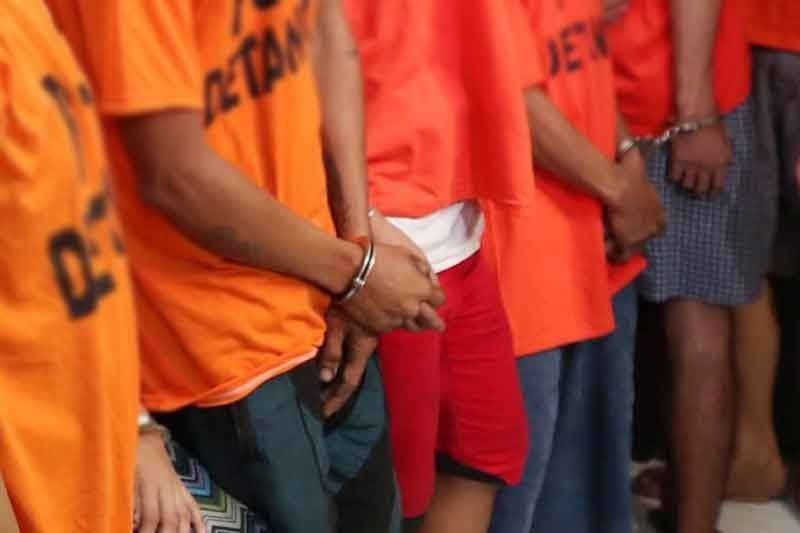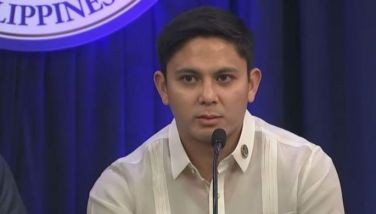BuCor releases 34 more surrendered convicts

MANILA, Philippines — The oversight committee of the Department of Justice (DOJ) has approved the release of 34 persons deprived of liberty (PDLs) who heeded the order of President Duterte to surrender amid issues surrounding the good conduct time allowance (GCTA) law.
DOJ deputy spokesman and assistant secretary Neal Bainto told reporters that the batch of 34 PDLs will be freed shortly after processing their release papers and other certifications on their liberty.
Bainto said the joint task force of the DOJ and the Bureau of Corrections (BuCor) has recommended to the oversight committee the release of the said PDLs as they were freed on good faith and not by the GCTA law.
“This batch of 34 individuals, once released by the BuCor, should bring the total released PDL-surrenderers to 158,” Bainto said.
A total of 2,221 PDLs, 307 more than the 1,914 inmates who were erroneously freed because of the GCTA law, have surrendered to authorities after the 15-day ultimatum of Duterte for their recommitment lapsed last Sept. 19.
The DOJ said that the PDLs freed by the BuCor are those who were granted parole, were pardoned and granted presidential clemency.
Following the confusion on the computation of sentences for the PDLs, the DOJ and the Department of the Interior and Local Government (DILG) were compelled to revise the implementing rules and regulations (IRR) of Republic Act 10592, also known as the GCTA law.
Under the new guidelines, the DOJ and the DILG have excluded recidivists, habitual delinquents, escapees and those who are charged with heinous crimes from the GCTA law and from preventive imprisonment and special time allowance for loyalty.
The revised IRR took effect on Friday, a few days after it was published in national newspapers on Sept. 19.
DOJ spokesman Undersecretary Markk Perete said they are expecting the corrections officials to implement RA 10592 and its new IRR.
“The IRR already clarifies the exclusions, among other provisions of the law. The completion of the manual will only make efficient the process for its implementation, but should not be used as a ground for not implementing RA 10592,” Perete said.
Should implementers of the law encounter any problem, Perete said, “they can always seek guidance from the DOJ.”
Reduction of GCTA credits
Meanwhile, Cagayan de Oro City Rep. Rufus Rodriguez filed a bill to amend RA 10592, proposing to reduce the GCTA credits for convicts by more than half.
Under the amendatory bill, time credits for good behavior for prisoners would be reduced from 20 days to eight days during the first two years of imprisonment, 23 days to 10 days from the third year to the fifth year, 25 days to 12 days from the sixth year to the 10th year and 30 days to 15 days from the 11th year and onwards.
Rodriguez said the present time allowances for good behavior are “too generous.”
He retained the additional credit of 15 days under the law for each month of study, teaching or mentoring service rendered.
However, he proposed that the special loyalty allowance under Section 4 of RA 10592 be scrapped.
The section provides that a time credit of two-fifths of the period of a convict’s sentence shall be granted if such prisoner “chose to stay in the place of his confinement notwithstanding the existence of a calamity or catastrophe.”
A check of the history of the law earlier made by The STAR showed that RA 10592 was a consolidation of a House bill, of which Rodriguez was an author, and three Senate measures.
The generous good behavior credits were part of the Senate version of the law.
For clarity, Rodriguez proposed an additional section in the law that explicitly excludes recidivists, habitual delinquents, escapees and persons charged with heinous crimes from the grant of good conduct time allowance.
He said while the present statute is clear, there were “some unscrupulous individuals who interpreted the law in a different manner and purposely caused confusion for their own personal gains.” Jess Diaz
- Latest
- Trending





























